A Simple Guide to Court-Ordered Rehab
In this guide:
- What is court-ordered rehab?
- What is the goal of court-ordered rehab?
- Does substance abuse treatment prevent people from committing future crimes?
- How does court-ordered rehab work?
- What criteria does an offender have to meet for court-ordered rehab?
- Who pays for court-ordered rehab?
- What are the different types of court-ordered rehab?
- Why is court-ordered rehab crucial for society?
- What happens if someone fails to complete court-ordered rehab?
- What are some court-order drug rehabilitation resources for Santa Barbara and Ventura County residents?
Millions of people in the U.S. suffer from drug and alcohol addiction. Not only does substance use disorder (SUD) directly affect the individual, it causes a ripple effect throughout that person’s family, community, and society. Unfortunately, people who are addicted to drugs can’t see past the addiction, and they will refuse to attend rehab on their own. Many times, their disorder creates a host of legal issues for them. Sometimes, people with SUD may be ordered by the criminal court system to attend a rehab facility.

What is court-ordered rehab?
Court-ordered rehab is often used as a valid form of alternative sentencing. In the past, addiction was seen as a moral failing and treated as a criminal matter. But recent scientific and medical breakthroughs are finding that addiction and substance use disorder are public health issues. Increasingly, addiction and substance abuse are being treated with rehabilitation methods, not with incarceration.
Unfortunately, alcohol and drug addiction often compel individuals to commit crimes while under the influence or to obtain the substance. Estimates indicate that 80% of all offenses that lead to jail in the U.S. stem from drug or alcohol abuse. Some of the most prevalent drug and alcohol-fueled crimes include domestic violence, DUIs, and property crimes. Furthermore, half of all jail and prison inmates meet the criteria for clinical addiction. And, 60% of all arrested persons test positive for illegal drugs at the time of their arrests. Almost 20% of prisoners claim they committed their crime to obtain money for drugs.
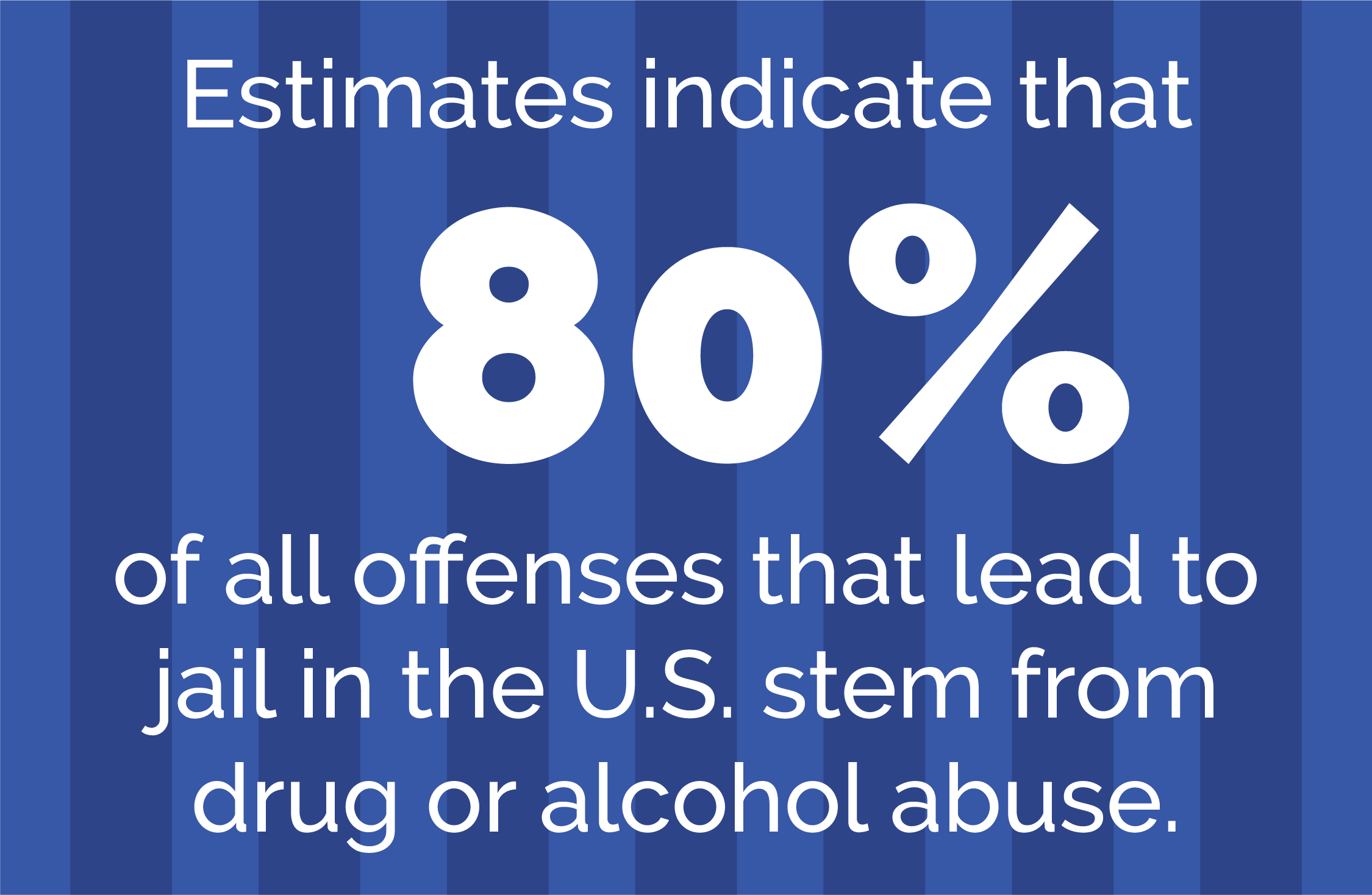
What is the goal of court-ordered rehab?
The U.S. prison population has exploded with the rise and prevalence of illegal drugs and addiction. Jail and prison don’t fix the underlying issue for prison inmates, and that issue is drug addiction. By issuing court-ordered rehab, arrested individuals can avoid jail time and get the help they truly need to live a life free from crime and substance abuse.
It’s true that almost any court in the U.S. can order a drug-related offender to go to rehab, but in some jurisdictions, there are special courts that are explicitly designed to handle drug offenses. The goal of these special courts is to improve outcomes for the offender. The hope of the criminal justice system and drug court is to influence offenders positively by requiring their participation in a treatment facility or a mental health center.
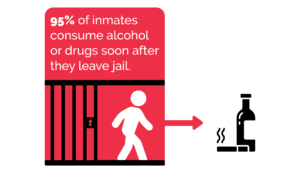 When it comes to jail and prison inmates and substance abuse after release, the statistics paint a grim picture. 95% of inmates consume alcohol or drugs soon after they leave jail, and between 60% and 80% of released inmates will go on to commit another drug-related crime.
When it comes to jail and prison inmates and substance abuse after release, the statistics paint a grim picture. 95% of inmates consume alcohol or drugs soon after they leave jail, and between 60% and 80% of released inmates will go on to commit another drug-related crime.
People who enter a rehab facility and complete a treatment program have better odds of breaking the addiction cycle. Also, treatment facilities don’t just detox the individual. They also give them tools and access to resources that can help them improve their lives. Access to ongoing treatment plans and support groups can break the cycle of addiction and the cycle of crime, too. People who commit a drug-related offense will often agree to seek treatment and complete a court-ordered addiction program to either avoid jail or receive a sentence of lesser severity.
How does court-ordered rehab work?
To obtain court-ordered rehab instead of going to prison, a screening investigation has to take place first. Family members and loved ones of the offender can request a screening investigation. Police officers and addiction specialists conduct and participate in the investigation.
The offender is taken into custody, where professionals are able to evaluate if the person is unable to control their actions because of their addiction and if they are suffering from health problems related to drug or alcohol abuse. If the police and addiction specialists find that the person is a danger to themselves and others on account of their addiction, an emergency court order is issued, and a hearing is scheduled.
At the hearing, the offender, their attorney, and their loved ones can ask the judge for court-ordered rehab. The judge has the final say on if the person will go to rehab or serve jail time. Charges won’t be dismissed until the offender completes a rehab program. At the hearing, the offender can plead either guilty or not guilty for the crime.
- The crime was nonviolent
- The offense was either a direct or indirect result of drug or alcohol dependence.
- The court believes that the offender would benefit from rehab
- The individual qualifies for a probationary sentence
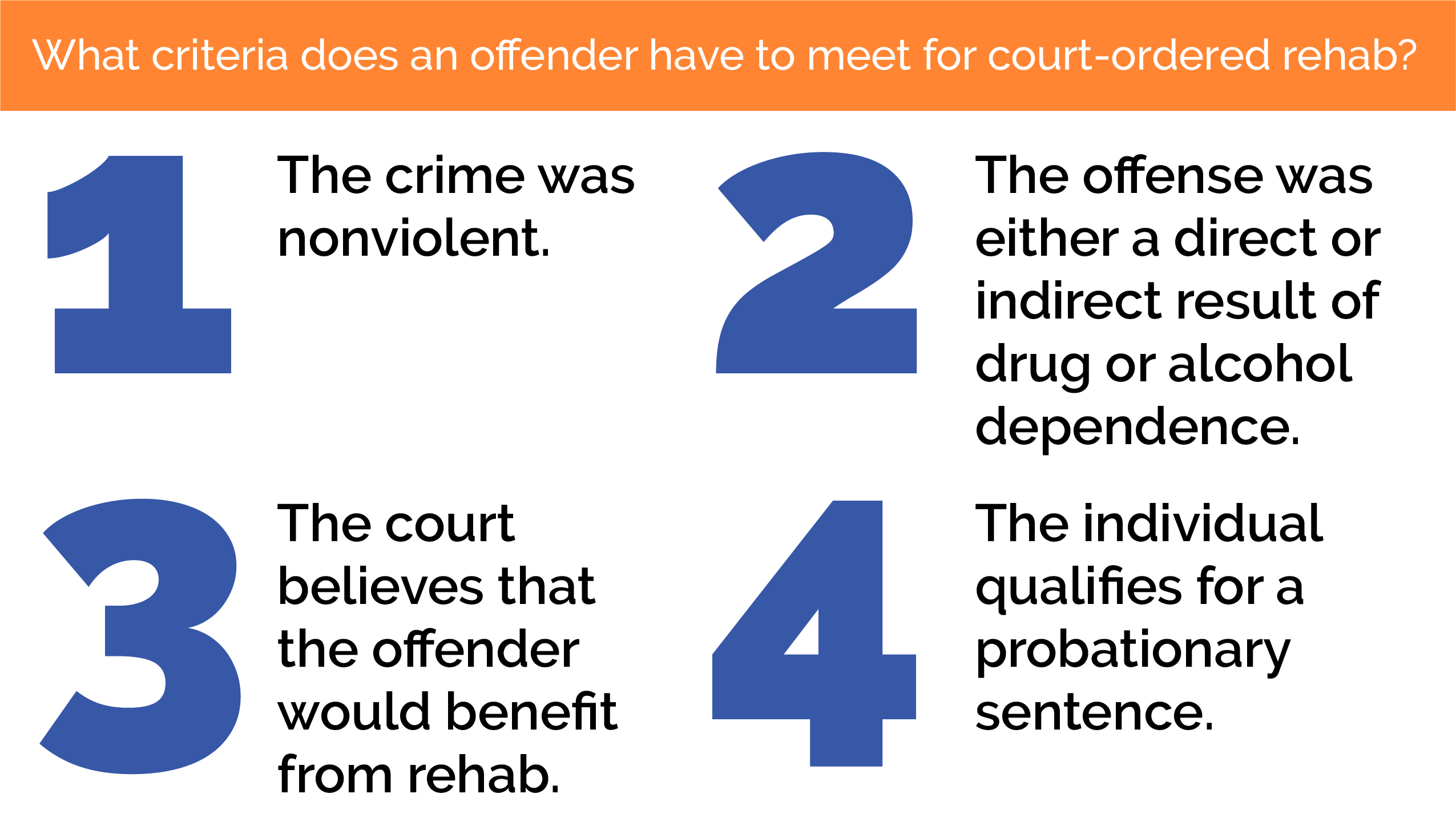
The person sentenced is required to pay for their treatment facility, but they can choose what facility they will attend. Insurance may pay for all or part of a treatment program, and some facilities offer reduced or subsidized payments for qualifying individuals.
When an offender is ordered to attend rehab, the drug court will assemble a treatment team. The treatment team is comprised of a judge, attorneys, case managers, healthcare providers, and therapists. These professionals all work with the offender to ensure an effective treatment plan, and also to make sure the offender is complying with the court order.
The team of legal professionals, as well as healthcare providers, seek to give the offender a therapeutic experience that is well coordinated between the legal sphere and the healthcare sphere. Team members maintain regular communication, encouragement, and support for the offender, their friends, and family members throughout the hearings, therapy, and discharge.
Once a person is court-ordered to attend a drug treatment program, they will have to complete some or all of the following criteria:
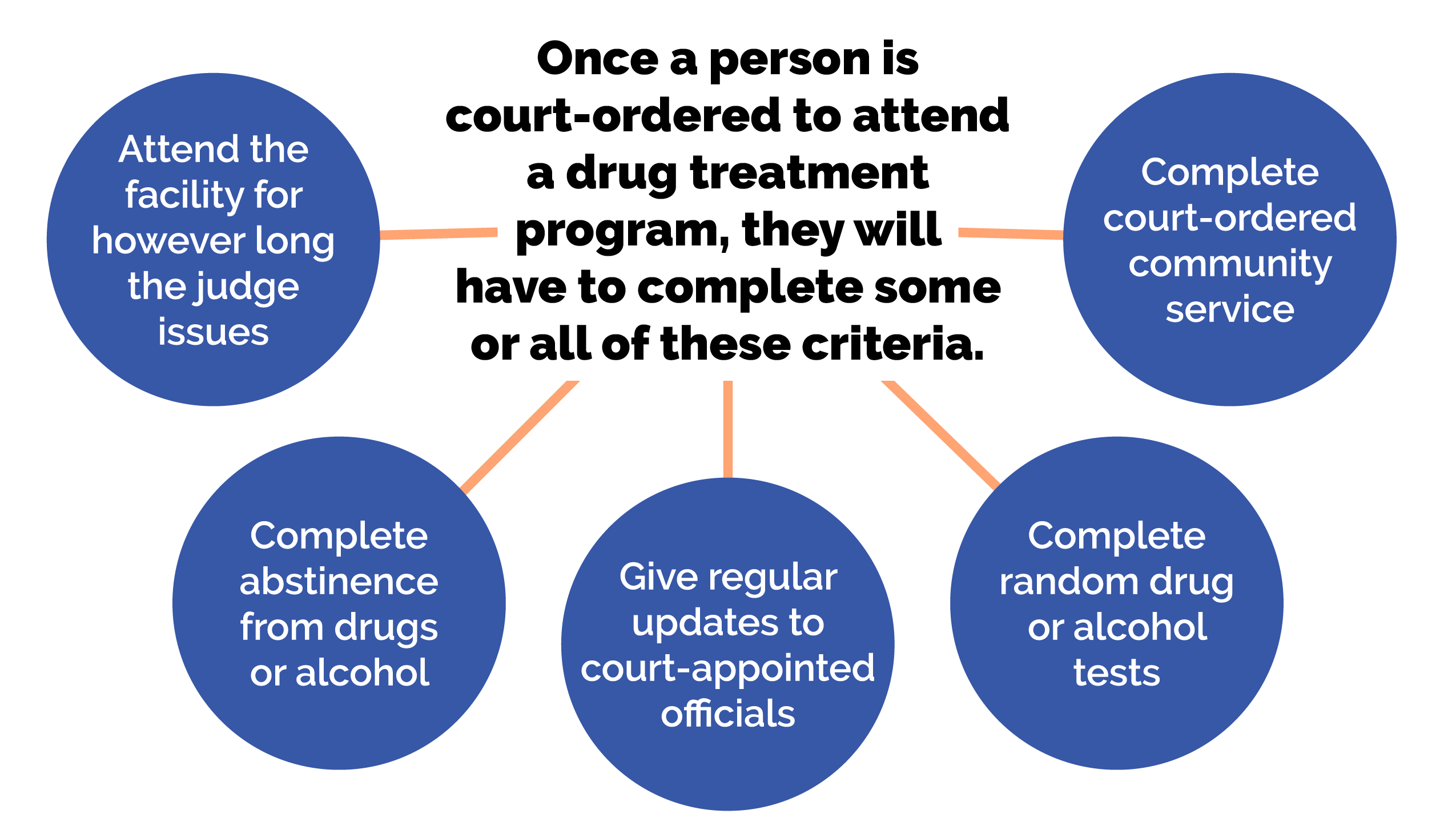
- Attend the facility for however long the judge issues
- Complete abstinence from drugs or alcohol
- Give regular updates to court-appointed officials
- Complete random drug or alcohol tests
- Complete court-ordered community service
What are the different types of court-ordered rehab?
It’s vital that treatment methods are tailored to the individual. The more specific the treatment is, the higher the chances of success are for the person attending. The court system does its best to offer different types of rehab and treatment for offenders.
- Accelerated Pretrial Rehab Programs
- Educational Programs
- Group Counselling Programs
- Residential Counseling
- Detox and Inpatient Rehab Programs
These programs have strict requirements. The person ordered to attend cannot have attended a similar program before, and their crime must not be a felony. Once they are ordered to attend an accelerated program, they are released to the drug court support services department. All charges are dropped upon successful completion of a rehab program.
These are the most common and most frequently ordered programs. They are usually the most accessible rehabilitation programs for offenders. People who have been charged with driving while under the influence of alcohol are often eligible for this program. Court files are sealed upon successful completion. Usually, these programs last between 10 to 15 weeks. The judge will dismiss the charges once the defendant completes the program.
For those charged with possession of drugs or drug-related paraphernalia, conditions may limit their eligibility for an educational program. It must be their first time attending to meet eligibility requirements. Programs last 15 weeks, and upon completion, charges are dropped.
Group therapy sessions are the second-most commonly ordered rehab option. Group counseling programs are often based on a 12-step model.
A court-order for residential counseling is the most intense program for drug and alcohol offenders. In many cases, residential counseling programs are carried out within the larger prison system. Inmates are separated from the general prison population and can receive drug or alcohol abuse treatment and counseling.
Sometimes the drug court may order an offender to stay in a medically-supervised detox center and inpatient rehab facility in place of jail time or a harsh sentence. In many cases, community service hours are also ordered, or the completion of vocational training must take place.
The courts understand that relapse is a standard part of the recovery process. Relapse is a part of the journey to sober living, and it isn’t an indication that rehab or detox isn’t effective. Drug addiction and abuse are health issues, the same as diabetes or high blood pressure. People who suffer from a physical health condition often relapse, and need adjustments to their lifestyle or medication regimen. The same principle applies to substance use disorders.
In many cases, participation in a court-ordered rehab facility will continue after the therapy ends. For offenders who have been ordered to attend rehab, the court will continue to monitor their progress and will impose consequences if the person commits any future drug-related offenses.
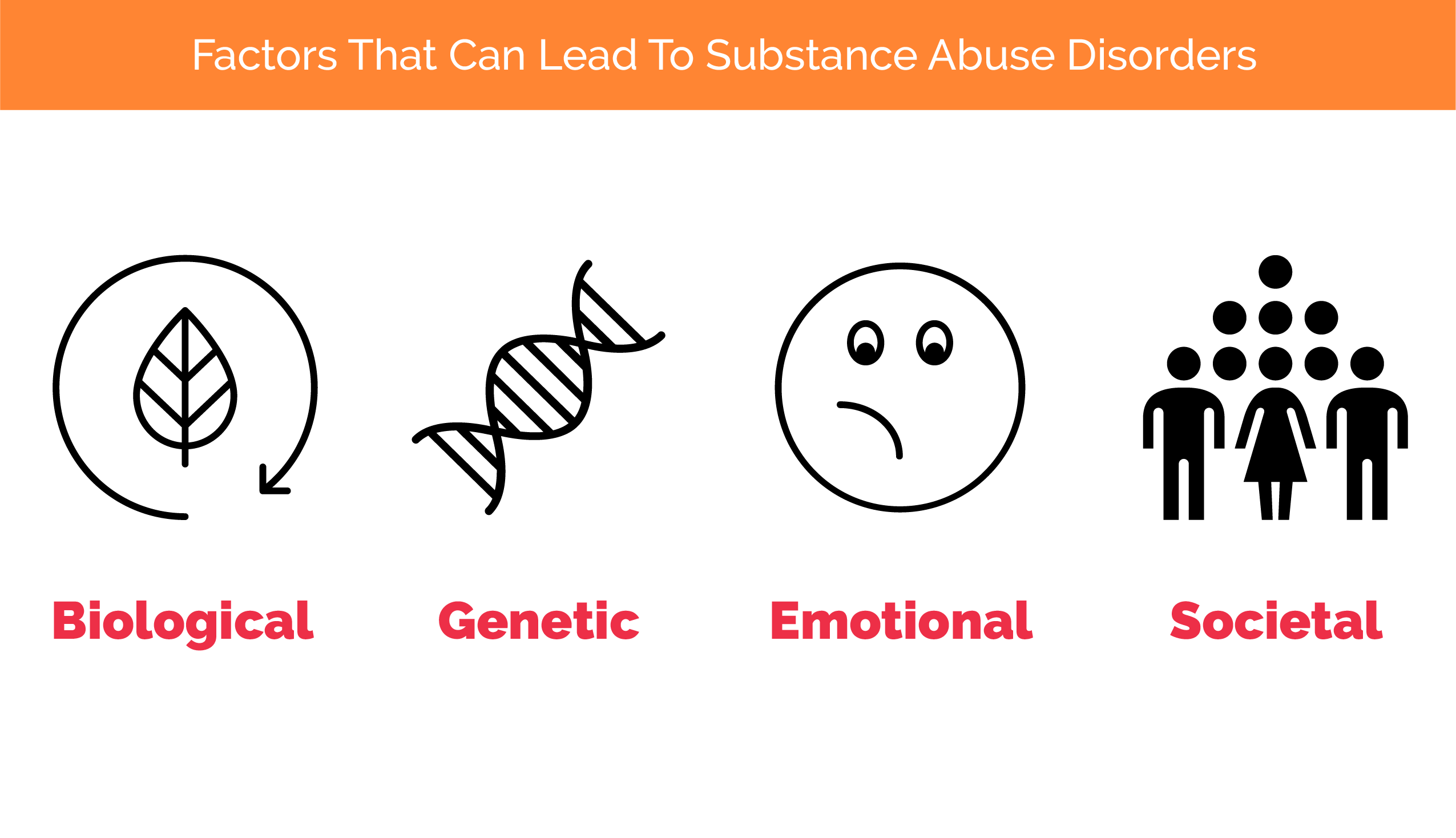
Substance abuse disorder is a complex health condition. Many factors contribute to substance abuse and addiction disorders. Science is only now beginning to understand how deep the problem goes. And the problem includes a myriad of factors that stem from biological, genetic, emotional, and societal complexities. Forced abstinence of drugs or alcohol due to incarceration does not address the root of the problem, which is a substance abuse disorder. Imprisonment does not bring the offender any closer to achieving sobriety and a life free from crime. Upon release, drug offenders aren’t given the tools to help them avoid relapse, or seek help from the appropriate facilities if they re-offend.
By ordering rehab and substance abuse treatment, the courts are getting to the root issue. They are equipping offenders with the tools to help them address the root of their disorder. Court-ordered rehab teaches people how to recover from substance abuse and begin living a life free from crime.
Anyone who is ordered to attend rehab by a judge must complete the program. If they fail to adhere to the terms set forth by the court, the offender will face prosecution for their crime to the fullest extent of the law. Offenders can plead guilty, but they will be convicted and have to deal with any applicable fines or jail time associated with the offense. The point of court-ordered rehab is to give offenders a chance to achieve sobriety and avoid criminal prosecution for their disorder. Failing to complete rehab forfeits this bargain.
But if the court-ordered rehab program is successfully completed, charges are dropped. In addition, the crime will not show up on the person’s criminal record. Court ordered rehab gives people a chance to maintain a clean slate.
There are several resources available for offenders and their families in the Southern California area. If you or a loved one has been ordered to attend rehab to avoid criminal prosecution, please visit the following pages:
- The Council on Alcoholism and Drug Abuse Adult Programs and Services
- The Ventura County Behavioral Health Department
- List of Programs for Addicted Criminal Justice Clients in California
While court-ordered rehab is an effective way to get treatment for a substance abuse disorder, successful completion of a treatment program is only the first step. Addiction and abuse are health conditions that will affect someone for the rest of their lives. Fortunately, numerous treatment programs specifically cater to preventing relapse rates amongst recovering drug and alcohol addicts. It’s crucial that people in recovery continue to receive support and therapy for their disorder. If you or someone you love is currently struggling with issues stemming from a substance abuse disorder, please reach out for help.
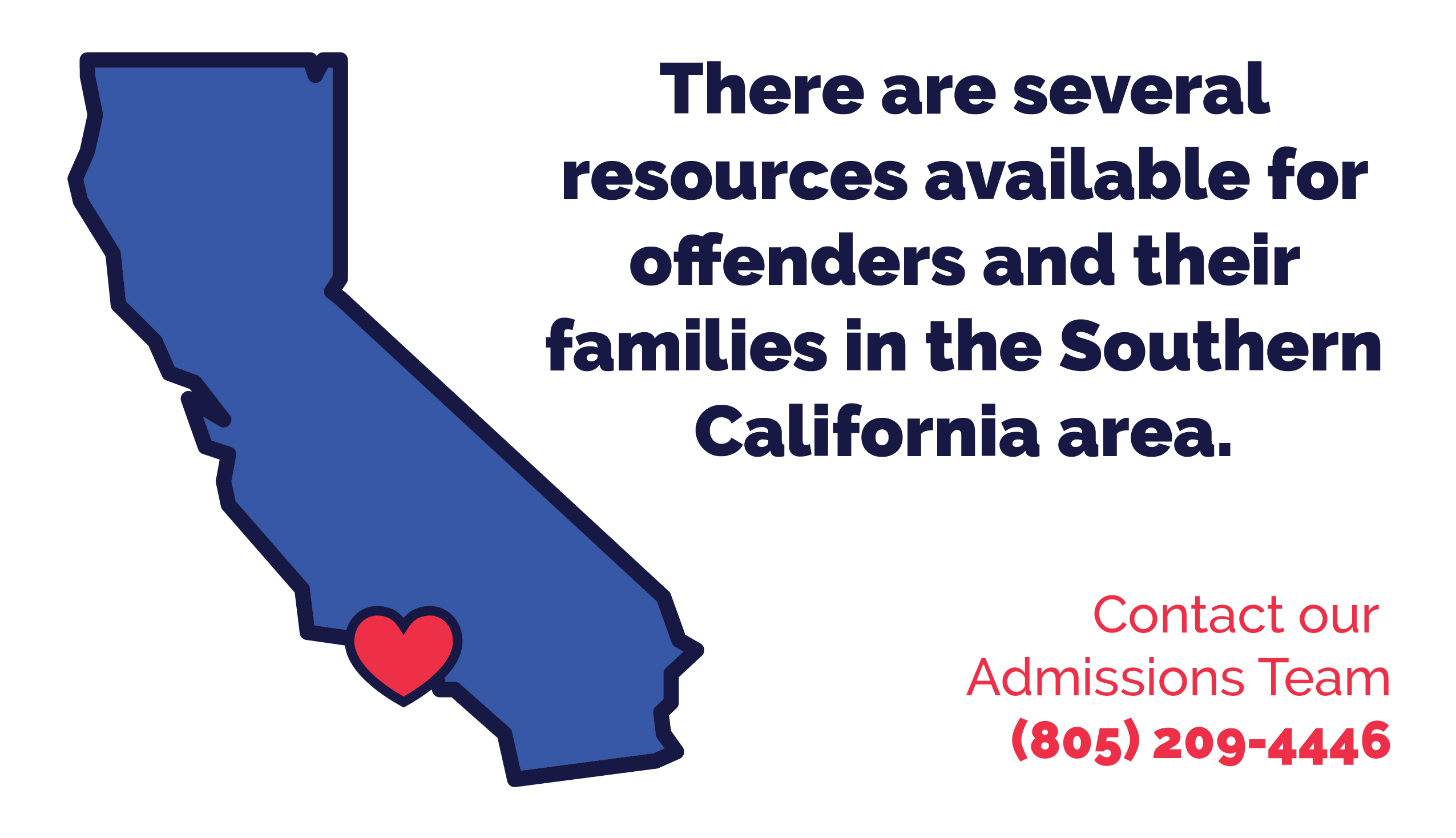
This guide is intended to be informational. If you are considering help for you or your loved one and would like more information, please consult a medical professional or licensed treatment facility.

